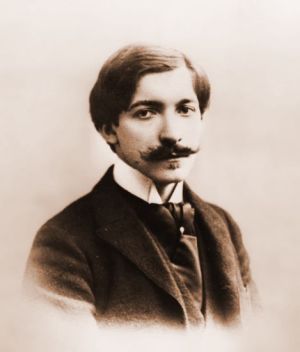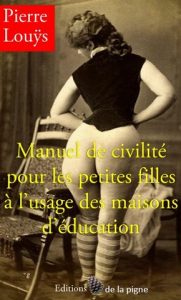One of our staff members is contributing considerably to a News Archiving service at Mu. Any well educated (Masters, PhD or above) users who wish to make comments on news sites, please contact Jim Burton directly rather than using this list, and we can work on maximising view count.
Pierre Louys: Difference between revisions
No edit summary |
No edit summary |
||
| (12 intermediate revisions by 2 users not shown) | |||
| Line 1: | Line 1: | ||
[[File:Pierre Louÿs portrait.jpg|thumb|Pierre Louÿs]] | [[File:Pierre Louÿs portrait.jpg|thumb|Pierre Louÿs]] | ||
'''Pierre Louÿs''' (Born 10 December 1870 – Died 4 June 1925), born '''Pierre Félix Louis''', was a French poet and writer, most renowned for lesbian and classical (ancient Greek) themes in some of his writings. He was made first a ''Chevalier'', and then an Officer of the ''Légion d'honneur'', for his contributions to French literature. His most significant works are the erotic novel ''Aphrodite'' (1896) and a poetry collection of translated Sapphic, Ancient Greek lesbian poetry, titled ''Les Chansons de Bilitis'' or - in English - ''The Songs of Bilitis'' (1894). | '''Pierre Louÿs''' (Born 10 December 1870 – Died 4 June 1925), born '''Pierre Félix Louis''', was a French poet and writer, most renowned for lesbian and classical (ancient Greek) themes in some of his writings. He was made first a ''Chevalier'', and then an Officer of the ''Légion d'honneur'', for his contributions to French literature. His most significant works are the erotic novel ''Aphrodite'' (1896) and a poetry collection of translated Sapphic, Ancient Greek lesbian poetry, titled ''Les Chansons de Bilitis'' or - in English - [[Wikipedia:The_Songs_of_Bilitis|''The Songs of Bilitis'']] (1894). Telling the life story of a fictional character called Bilitis who is said to be a contemporary of the Ancient Greek lesbian icon Sappho, the first lesbian civil and political rights organization in the United States, formed in San Francisco in 1955, called itself [[Wikipedia:Daughters_of_Bilitis|''Daughters of Bilitis'']] after the character. | ||
Louÿs studied at the ''École Alsacienne'' in Paris, and there developed a good friendship with a future Nobel Prize winner and champion of [[Pederasty| | Louÿs studied at the ''École Alsacienne'' in Paris, and there developed a good friendship with a future Nobel Prize winner and champion of [[Pederasty|pederasty]] and homosexual rights, [[Andre Gide]]. During the 1890s, he became a friend of the Irish homosexual dramatist [[Oscar_Wilde|Oscar Wilde]], and was the dedicatee of Wilde's 1891 play ''Salomé'' in its original (French) edition. Louÿs was thus able to socialize with homosexuals. He started writing his first erotic texts at the age of 18. | ||
==Louÿs's Handbook for Little Girls== | ==Louÿs's Handbook for Little Girls== | ||
In 1917, Louÿs wrote the erotic literary work ''The Manuel de civilité pour les petites filles à l'usage des maisons d'éducation'' (English: '''Handbook of behaviour for little girls to be used in educational establishments'''). It was published anonymously after his death in 1927. | In 1917, Louÿs wrote the erotic literary work ''The Manuel de civilité pour les petites filles à l'usage des maisons d'éducation'' (English: '''Handbook of behaviour for little girls to be used in educational establishments'''). It was published anonymously after his death in 1927, and was translated and released as an English paperback book in 2010, available for purchase online.<ref>The Young Girl's Handbook of Good Manners for Use in Educational Establishments (Wakefield Handbooks) Paperback – February 28, 2010 by Pierre Louÿs (Author), Geoffrey Longnecker (Translator). ([https://www.amazon.com/Young-Handbook-Manners-Educational-Establishments-ebook/dp/B08FMY6JV4?ref_=ast_author_mpb amazon.com link])</ref> [[Wikipedia:Manuel de civilité pour les petites filles à l'usage des maisons d'éducation|Wikipedia described]] the book: | ||
[[File:Pierre Louÿs handbook cover.jpg|thumb|One of many book covers for the ''Handbook'']] | |||
<blockquote>''It takes the form of a parody of the rigorous educational handbooks of the time, and is thus composed of short pieces of advice (generally a sentence or two) arranged into topics: "At home", "Duties towards your mother", "In class", etc. The tone of the work is sharp, even concise, the style particularly believable and chatty. Pierre Louÿs uses irony readily to evoke the cheap loves of the perverse young girls, and this relative distance enables him to despise any moral censure (incest, pedophilia...). ''[...]'' "The Handbook of civility" is undoubtedly the most subversive work of Louÿs, a true attack against the middle-class puritanism of the Belle Époque.'' | |||
By the way of illustration, the "Glossary" which opens the work comprises this warning: | ''By the way of illustration, the "Glossary" which opens the work comprises this warning:'' | ||
''"We have considered it useless to explain the words: cunt, slit, fanny, mound, cock, tail, bollock, testicle, cum (verb), cum (noun), erection, masturbate, suck, lick, pump, kiss, fellate, screw, fuck, ass-fuck, ejaculate, dildo, lesbian, dyke, sixty-nine, cunnilingus, cute, whore, brothel. These words are familiar to all little girls.''"</blockquote> | |||
Other quotes include: | Other quotes include: | ||
<blockquote> | |||
*''"If you sit on your father's left thigh, do not grind your butt against his cock to make him hard, unless you are both alone."'' | |||
*''"Rest assured of this truth: Everyone around, whatever their age or sex may be, wants to be fellated by you; though the majority would never dare say so."'' | |||
*''"Marvel at the Lord's generosity, for he gives every little girl a pussy to welcome all cocks in the world, and - for variety - Allows the tongue to be used in place of the cock, the finger in place of the tongue, the anus in place of the pussy and the mouth in place of the anus."''</blockquote> | |||
A compilation of rhyming erotic poetry by Louÿs, written in secret and published after his death, received an English translation in 2014 as "'''Pybrac'''". Available for purchase online,<ref> | |||
Pybrac Paperback – May 31, 2014 by Pierre Louÿs (Author), Toyen (Illustrator), Geoffrey Longnecker (Translator) ([https://www.amazon.com/Pybrac-Pierre-Lou%C3%BFs/dp/1939663024/ref=sr_1_7?qid=1680650602&refinements=p_27%3APierre+Lou%C3%BFs&s=books&sr=1-7&text=Pierre+Lou%C3%BFs amazon.com link]).</ref> the book is described as "possibly the filthiest collection of poetry ever published, and offers a taste of what the [[Marquis de Sade]] might have produced if he had ever turned his hand to verse." | |||
<blockquote>''First published posthumously in 1927, Pybrac was, with The Young Girl’s Handbook of Good Manners, one of the first of Louÿs’ secret erotic manuscripts to see clandestine publication. Composed of 313 rhymed alexandrine quatrains, the majority of them starting with the phrase "I do not like to see…," Pybrac is in form a mockery of sixteenth-century chancellor poet Guy Du Faur, Seigneur de Pibrac, whose moralizing quatrains were common literary fare for young French readers until the nineteenth century.''</blockquote> | |||
==See also== | |||
<div style="column-count:3;-moz-column-count:3;-webkit-column-count:3"> | |||
*[[Andre Gide]] | |||
*[[Roger Peyrefitte]] | |||
*[[Jacques d'Adelsward-Fersen]] | |||
*[[GRED]] and [[CRIES]] - French 1970-1980s MAP organizations | |||
*[[Henry de Montherlant]] | |||
*[[Jean-Claude Féray]] | |||
*[[Alain Robbe-Grillet]] | |||
*[[Tony Duvert]] | |||
*[[Norman Douglas]] | |||
*[[Johann Wolfgang von Goethe]] | |||
*[[Thomas Mann]] | |||
</div> | |||
==References== | ==References== | ||
[[Category:Official_Encyclopedia]][[Category:People]][[Category:People: Deceased]][[Category:Gay]][[Category:People: French]][[Category:People: Popular Authors]][[Category:People: Critical Analysts]] | [[Category:Official_Encyclopedia]][[Category:People]][[Category:People: Deceased]][[Category:Gay]][[Category:People: French]][[Category:People: Popular Authors]][[Category:People: Critical Analysts]] | ||
Latest revision as of 03:52, 21 September 2023

Pierre Louÿs (Born 10 December 1870 – Died 4 June 1925), born Pierre Félix Louis, was a French poet and writer, most renowned for lesbian and classical (ancient Greek) themes in some of his writings. He was made first a Chevalier, and then an Officer of the Légion d'honneur, for his contributions to French literature. His most significant works are the erotic novel Aphrodite (1896) and a poetry collection of translated Sapphic, Ancient Greek lesbian poetry, titled Les Chansons de Bilitis or - in English - The Songs of Bilitis (1894). Telling the life story of a fictional character called Bilitis who is said to be a contemporary of the Ancient Greek lesbian icon Sappho, the first lesbian civil and political rights organization in the United States, formed in San Francisco in 1955, called itself Daughters of Bilitis after the character.
Louÿs studied at the École Alsacienne in Paris, and there developed a good friendship with a future Nobel Prize winner and champion of pederasty and homosexual rights, Andre Gide. During the 1890s, he became a friend of the Irish homosexual dramatist Oscar Wilde, and was the dedicatee of Wilde's 1891 play Salomé in its original (French) edition. Louÿs was thus able to socialize with homosexuals. He started writing his first erotic texts at the age of 18.
Louÿs's Handbook for Little Girls
In 1917, Louÿs wrote the erotic literary work The Manuel de civilité pour les petites filles à l'usage des maisons d'éducation (English: Handbook of behaviour for little girls to be used in educational establishments). It was published anonymously after his death in 1927, and was translated and released as an English paperback book in 2010, available for purchase online.[1] Wikipedia described the book:

It takes the form of a parody of the rigorous educational handbooks of the time, and is thus composed of short pieces of advice (generally a sentence or two) arranged into topics: "At home", "Duties towards your mother", "In class", etc. The tone of the work is sharp, even concise, the style particularly believable and chatty. Pierre Louÿs uses irony readily to evoke the cheap loves of the perverse young girls, and this relative distance enables him to despise any moral censure (incest, pedophilia...). [...] "The Handbook of civility" is undoubtedly the most subversive work of Louÿs, a true attack against the middle-class puritanism of the Belle Époque.
By the way of illustration, the "Glossary" which opens the work comprises this warning:
"We have considered it useless to explain the words: cunt, slit, fanny, mound, cock, tail, bollock, testicle, cum (verb), cum (noun), erection, masturbate, suck, lick, pump, kiss, fellate, screw, fuck, ass-fuck, ejaculate, dildo, lesbian, dyke, sixty-nine, cunnilingus, cute, whore, brothel. These words are familiar to all little girls."
Other quotes include:
- "If you sit on your father's left thigh, do not grind your butt against his cock to make him hard, unless you are both alone."
- "Rest assured of this truth: Everyone around, whatever their age or sex may be, wants to be fellated by you; though the majority would never dare say so."
- "Marvel at the Lord's generosity, for he gives every little girl a pussy to welcome all cocks in the world, and - for variety - Allows the tongue to be used in place of the cock, the finger in place of the tongue, the anus in place of the pussy and the mouth in place of the anus."
A compilation of rhyming erotic poetry by Louÿs, written in secret and published after his death, received an English translation in 2014 as "Pybrac". Available for purchase online,[2] the book is described as "possibly the filthiest collection of poetry ever published, and offers a taste of what the Marquis de Sade might have produced if he had ever turned his hand to verse."
First published posthumously in 1927, Pybrac was, with The Young Girl’s Handbook of Good Manners, one of the first of Louÿs’ secret erotic manuscripts to see clandestine publication. Composed of 313 rhymed alexandrine quatrains, the majority of them starting with the phrase "I do not like to see…," Pybrac is in form a mockery of sixteenth-century chancellor poet Guy Du Faur, Seigneur de Pibrac, whose moralizing quatrains were common literary fare for young French readers until the nineteenth century.
See also
- Andre Gide
- Roger Peyrefitte
- Jacques d'Adelsward-Fersen
- GRED and CRIES - French 1970-1980s MAP organizations
- Henry de Montherlant
- Jean-Claude Féray
- Alain Robbe-Grillet
- Tony Duvert
- Norman Douglas
- Johann Wolfgang von Goethe
- Thomas Mann
References
- ↑ The Young Girl's Handbook of Good Manners for Use in Educational Establishments (Wakefield Handbooks) Paperback – February 28, 2010 by Pierre Louÿs (Author), Geoffrey Longnecker (Translator). (amazon.com link)
- ↑ Pybrac Paperback – May 31, 2014 by Pierre Louÿs (Author), Toyen (Illustrator), Geoffrey Longnecker (Translator) (amazon.com link).